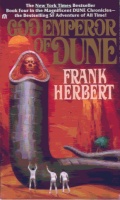 I'm a little bummed I didn't like GEoD a little more. I had high expectations. Lots of people like this book. And really it's the epicenter of the Dune series. Leto II has become indistinguishable from a true god in his quest to set the universe on the "Golden Path". In other words, save them from extinction. It's surprising to me how much of this story was already laid out by Herbert in written form before his first book was even published. Children and Messiah had large sections committed to text before Dune was completed. He knew where he was going. And so in many ways GEoD seems like an afterthought. Sometimes the journey is more interesting than the end. Most of what occurs can be seen as inevitable given the pre-story in the previous three books.
I'm a little bummed I didn't like GEoD a little more. I had high expectations. Lots of people like this book. And really it's the epicenter of the Dune series. Leto II has become indistinguishable from a true god in his quest to set the universe on the "Golden Path". In other words, save them from extinction. It's surprising to me how much of this story was already laid out by Herbert in written form before his first book was even published. Children and Messiah had large sections committed to text before Dune was completed. He knew where he was going. And so in many ways GEoD seems like an afterthought. Sometimes the journey is more interesting than the end. Most of what occurs can be seen as inevitable given the pre-story in the previous three books.The fundamental problem Leto sees (and his father Paul saw) is that humans will become extinct through an evolution of machines created by the Ixians. Humans will stagnate due to their ability to foresee the future and machines will evolve; eventually destroying humans. The way out is to stop the stagnation. In other words eliminate prescience. How does he propose to do this? Become a god (via the sandworm organism), take over the Bene Gesserit's breeding program to create a human invisible to prescient minds, cut off the spice supply so no one other than Leto has significant prescience, and to control the universe to an extent that the other major parties try to create devices that hide themselves from Leto's prescient probing - "no-devices". This ultimately will make a universe where prescience is useless. Paul saw this extinction fate as well but recoiled from the fact he had to become a grotesque god to do this. Hence the disturbing moment when he meets his son Leto in Messiah and realizes Leto has more courage than him.
So as you can see most of this was subtly set up before we get to GEoD. It becomes a matter of carrying this Golden Path out to its fruition. Ending with Leto casting himself out to start a new sandworm cycle on Dune. We all know its heading there and this takes some of the oomph out of the story.
The other aspect that detracts from the enjoyment of the book but really should not be a criticism is that there is no clear character to like or root for. Leto should be that character since he is saving the human race, but in reality he persecutes the human race to enable them to become creative and in order for them to mature. He wields with a big stick and as he becomes more wormlike, loses touch with his humanity. There are the assorted sycophantic followers who are despicable at times, the rebels who seem just as power hungry as Leto, and finally the ever present ghola, Duncan Idaho, who has lost all of his charm (and gained a lot of anger) as a result of being a play thing of Leto's over the last 3,500 years. It's a motley bunch.

No comments:
Post a Comment